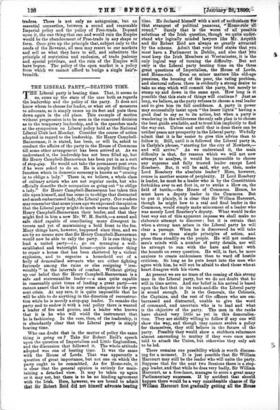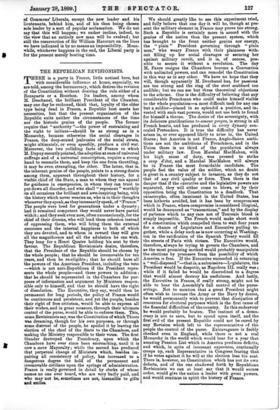THE LIBERAL PARTY,—BEATING TIME.
THE Liberal party is beating time. That, it seems to us, sums up the state of the case both as regards the leadership and the policy of the party. It does not know whom to choose for leader, or what set of measures to advocate, so it simply raises up its feet and puts them down again in the old place. This example of motion -without progression is to be seen in the rumoured decision as to the temporary leadership, and in the speeches made at the symposium on Liberal policy held at the National Liberal Club last Monday. Consider the course of action adopted in regard to the leadership. Sir Henry Campbell- Bannerman, it is stated, has been, or will be, asked to conduct the affairs of the party in the House of Commons till some other arrangement has been arrived at. As we understand it, the leadership has not been filled up, but Sir Henry Campbell-Bannerman has been put in as a sort of stop-gap. He would not take the permanent post even if he were asked to do so. He is simply fulfilling the function which in domestic economy is known as "coming in to oblige a lady." There is, we believe, a whole class of culinary artists who are not regular cooks, but who officially describe their occupation as going out "to oblige a lady." Sir Henry Campbell-Bannerman has taken this role upon himself, and has come in to oblige that distracted and much embarrassed lady, the Liberal party. Our readers may remember that some years ago we expressed the opinion that the Liberal party might do much worse than make Sir Henry Campbell-Bannerman their leader, and that they might find in him a new Mr. W. H. Smith,—a sound and safe chief capable of conciliating many divergent in- terests and yet of maintaining a bold front to the foe. Many things have, however, happened since then, and we are by no means sure that Sir Henry Campbell-Bannerman would now be able to rally the party. It is one thing to lead a united party—i.e., go on managing a well- established and watertight house—quite another thing to repair a house that has been shattered by a violent explosion, and to organise a household out of a body of demoralised servants who are either fighting furiously among the ruins or else resigning " irre- vocably" in the intervals of combat. Without giving up our belief that Sir Henry Campbell-Bannerman is a safe and statesmanlike leader a man quite capable in reasonably quiet times of leading a great party—we cannot assert that he is in any sense adequate to the pre- sent crisis. At any rate, it is quite impossible that he will be able to do anything in the direction of reconstruc- tion while he is merely a stop-gap leader. To remake the party and to endow it with a real policy there is wanted a leader of fire and genius, and a leader who knows that it is he who will wield the instrument that he is fashioning. In the case, then, of the leadership, it is abundantly clear that the Liberal party is simply beating time.
'Who can doubt that in the matter of policy the same thing is going on ? Take Sir Robert Reid's speech upon the question of Imperialism and Little Englandism, and the discussion that followed it. The whole attitude adopted was one of beating time. It was the same with the Howie of Lords. That was apparently a question of great importance, but not one on which the party ought to be committed. As for Home-rule, it is clear that the general opinion is entirely for main- taining a detached view. It may be taken up again or it may not, but there is to be no binding agreement with the Irish. Here, however, we are bound to admit that Sir Robert Reid did not himself advocate beating time. He declared himself with a sort of enthusiasm for that strangest of political panaceas, "Home-rule' all round." Surely that is the worst of all possibre solutions of the Irish question, though we quite under- stand why logically minded lawyers like Mr. Asquith and Sir Robert Reid are always so greatly attracted by the scheme. Admit that your brief states that you. must have a Parliament in Dublin, and also that you must keep the Irish Members at Westminster, it is the only logical way of turning the difficulty. But not only is the Liberal party beating time on the three great questions of Imperialism, the House of Lords, and Home-rule. Even on minor matters like old-age pensions, the housing of the poor, the rating problem, and electoral reform there is evidently a strong desire to take no step which will commit the party, but merely to stamp up and down in the same spot. How long is it possible that this state of things will continue ? Just as long, we believe, as the party refuses to choose a real leader and to give him its full confidence. A party in power may successfully insist upon "the lesser lights" having a good deal to say as to its action, but when a party is wandering in the wilderness the only safe plan is to choose the best guide available, and to trust him implicitly to find the way oat. Unless and until that is done there can be neither peace nor prosperity in the Liberal party. We fully admit that it is far easier to give this advice than to follow it. Still, until it is followed the Liberal party is, in Carlyle's phrase, "starting for the city of Nowhere,— and will arrive." As we understand it, the main difficulty is that, for reasons which we will not now attempt to analyse, it would be impossible to choose any supreme and fully trusted leader except Lord Rosebery. But, it will be said, why not, then, make Lord Rosebery the absolute leader ? Here, however, comes in another source of perplexity. If Lord Rosebery is leader, he must be a leader who is by the Constitution forbidden ever to set foot in, or to strike a blow on, the field of battle,—the House of Commons. Hence, he must have a deputy leader in the Commons. Bat to put it plainly, it is clear that Sir William Harcourt, though he might bow to a real and final leader in the Commons, would simply make mincemeat of a leader who was merely Lord Rosebery's deputy. What would be the best way out of this apparent impasse we shall make no elaborate attempt to discover; but it is certain that when a strong man arises in the Liberal party he will clear a passage. When he is discovered he will take up two or three simple principles of action, and press them steadily en the people. He will not confuse men's minds with a number of petty details, nor will he attempt to run with the hare and hunt with the hounds on every question. He will, in fact, be more anxious to create enthusiasm than to ward off hostile criticism. So long as he pats heart into the men who agree with him, he will not be afraid to shed those who at heart disagree with his views.
At present we see no trace of the coming of this strong man in the Liberal party, but we do not doubt that he will in time arrive. And our belief in his arrival is based upon the fact that in its rank-and-file the Liberal party is sound enough. It is the Generals, the Colonels, the Captains, and the rest of the officers who are em- barrassed and distracted, unable to give the word of command, and uncertain who is to lead and what is the objective of the party. The men in the ranks have shared very little as yet in this demoralisa- tion. They are stolidly willing to follow if any one will show the way, and though they cannot evolve a policy for themselves, they still believe in the future of the party. Possibly they would show a stubborn reluctance almost amounting to mutiny if they were once more told to attack the Union, but otherwise they only ask to be led.
There remains one possibility which is worth discuss- ing for a moment. It is just possible that Sir William Harcourt may still be the leader who will unite the party. Suppose that for the next two Sessions there is a stop- gap leader, and that while he does very badly, Sir William Harcourt, as a free-lance, manages to score a great many Parliamentary successes. If by accident that should happen there would be a very considerable chance of Eilr William Harcourt first gradually getting all the House of Commons' Liberals, except the new leader and his lieutenants, behind him, and of his then being chosen sole leader by a, sort of popular acclamation. We do not say that this will happen; we rather incline, indeed, to the view that an entirely new man will be evolved; but still the resurrection of Sir William Harcourt on the lines we have indicated is by no means an impossibility. Mean- while, whichever happens in the end, the Liberal party is for the present merely beating time.



















































 Previous page
Previous page